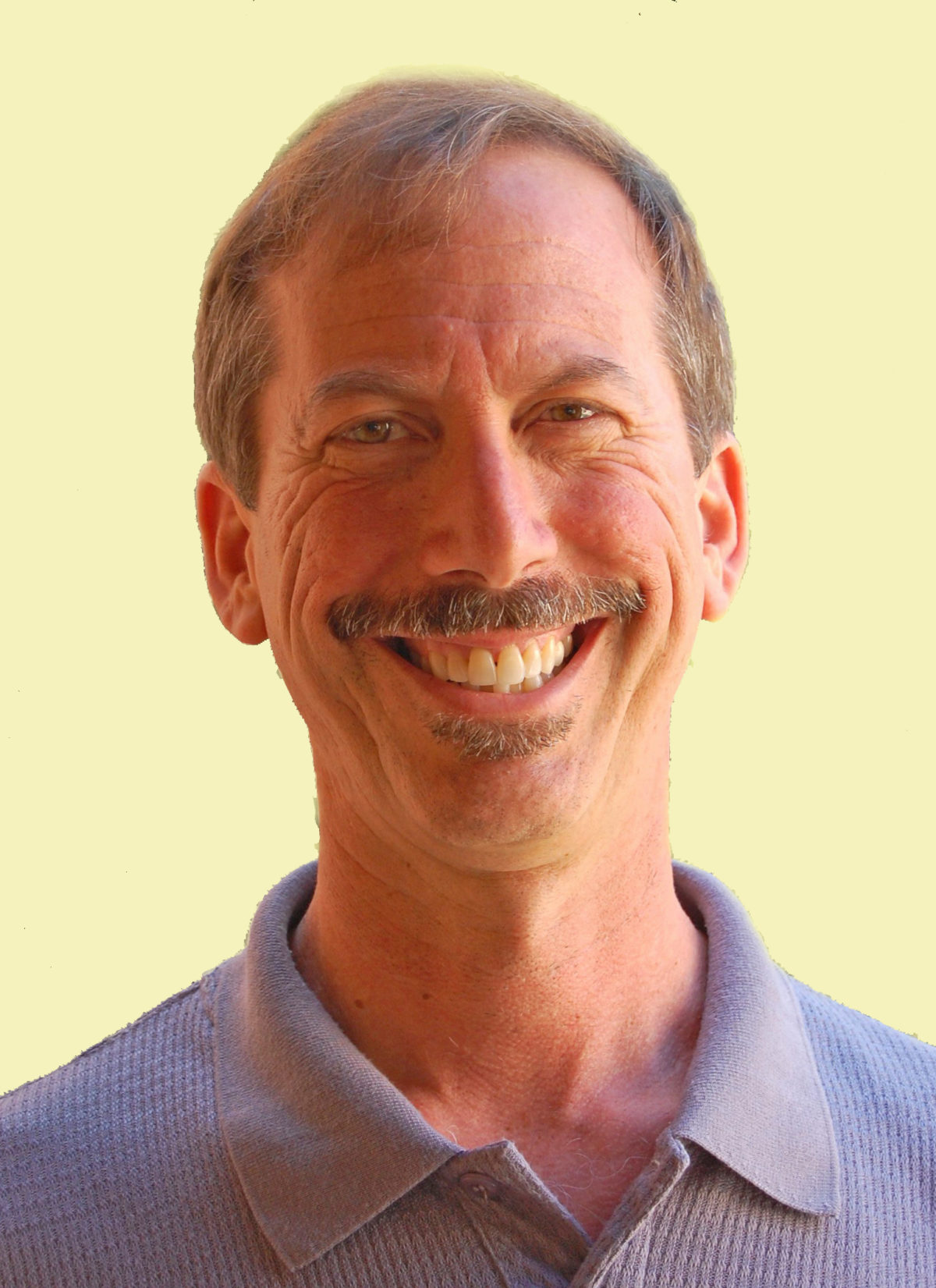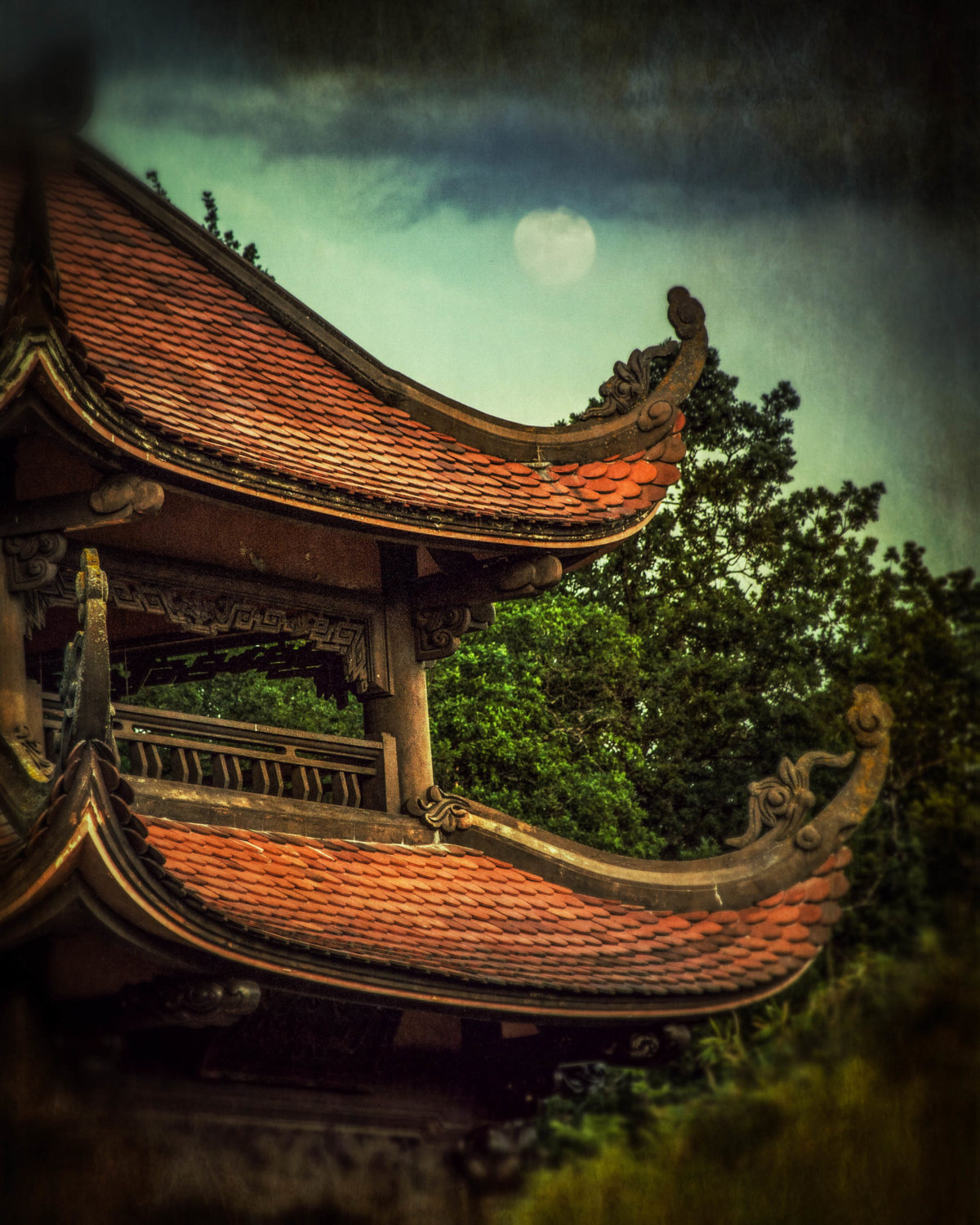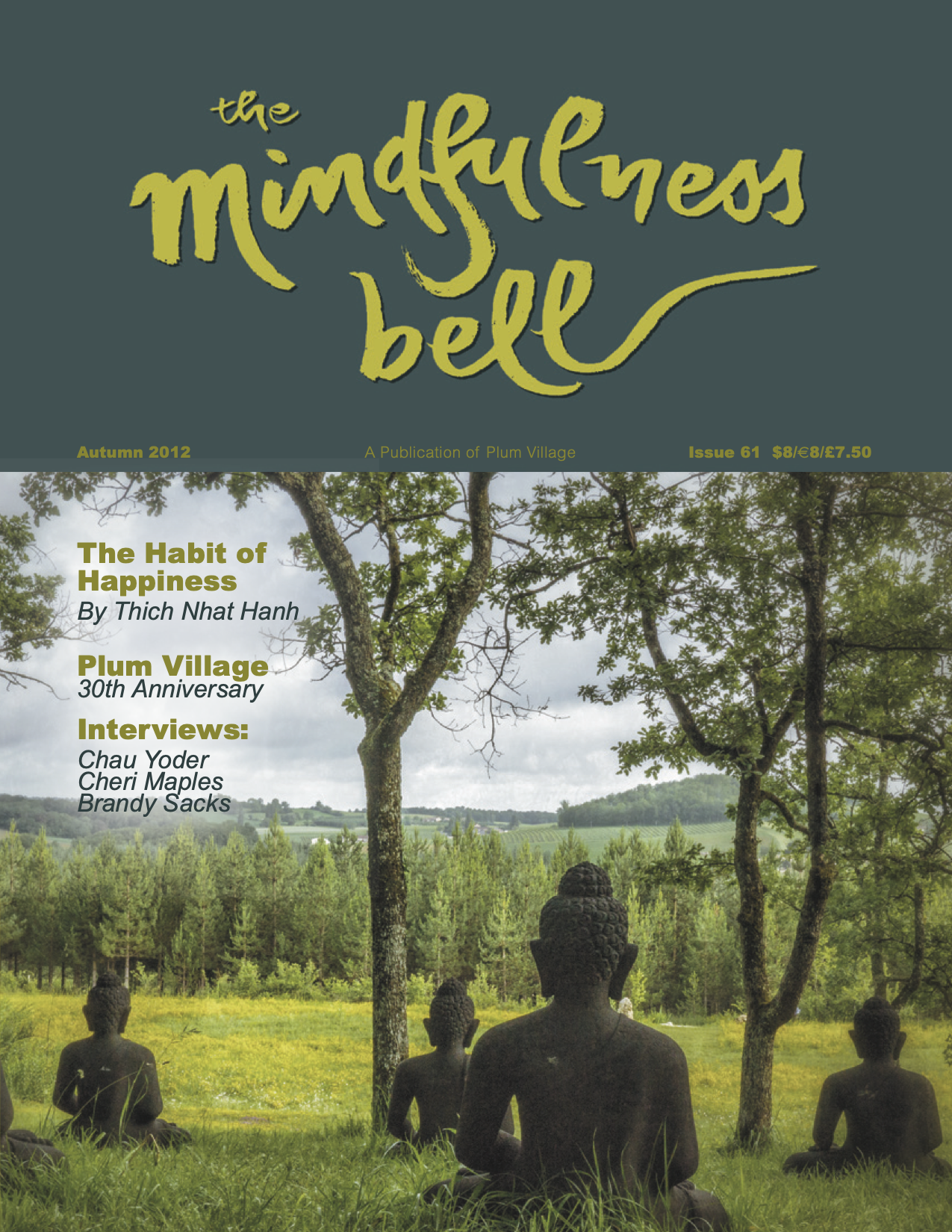An Interview with Brandy Sacks

Mindfulness Bell: Brandy, where did you grow up and what were your first religious experiences?
Brandy Sacks: I’ve lived all my adult life in San Diego, California. My parents were non-practicing Jews, and I really wasn’t raised with any spirituality. As I grew up, however, I was attracted to Buddhism, but most of what I saw here in California was Japanese Zen practice.
An Interview with Brandy Sacks

Mindfulness Bell: Brandy, where did you grow up and what were your first religious experiences?
Brandy Sacks: I’ve lived all my adult life in San Diego, California. My parents were non-practicing Jews, and I really wasn’t raised with any spirituality. As I grew up, however, I was attracted to Buddhism, but most of what I saw here in California was Japanese Zen practice. The Zen Center in San Francisco was very prominent. Japanese Zen really didn’t click for me; it seemed too strict, with too many rules. I did, however, become a Reiki Master.
MB: How did you first encounter the teachings of Thich Nhat Hanh?
BS: I first became aware of Thich Nhat Hanh through my Reiki teacher, who would quote from Thay’s writings and talks. In 1993, I heard Thay was coming to Malibu to lead a Day of Mindfulness. It was one of his earliest retreats on the West Coast; there was no Sangha in Los Angeles or San Diego at the time, and we might get a hundred people for a multi-day retreat, several hundred for a one-day event—much smaller than now. I went to the ‘93 Day of Mindfulness.
MB: Obviously it was a life-changing experience.
BS: It was. What really resonated for me were the Five Mindfulness Trainings, Thay’s vision for a global spirituality and ethic: reverence for life, true happiness, true love, loving speech and deep listening, and nourishment and healing. They were clear, direct, but not ten commandments. We weren’t striving for perfection, but by following these trainings we could become happier. That really made sense to me. I wanted a spiritual practice that emphasized happiness. So I took the Five Mindfulness Trainings at that retreat.
MB: Where did you go from there?
BS: I began reading Thay’s books and continued my sitting here on the West Coast. Then I heard he was coming in 1997 to lead a multi-day retreat in Santa Barbara. We had a huge turnout. People still talk about that one and the one that followed in 1999 as solidifying the West Coast community.
There was still no San Diego Sangha in 1997, but after the retreat there was a lot of talk about Sangha building. Thay stressed that if you wanted to become a member of the Order of Interbeing you had to lead or start a Sangha. About the same time, Christopher Reed, a lay Dharma teacher, started a meditation class that became the first San Diego Sangha. We later moved to the Wat Lau Temple for the Sangha’s meetings and I began leading it. I took the Fourteen Mindfulness Trainings at the retreat in 1999.
MB: How has your personal commitment to Buddhism influenced your professional career?
BS: I was an elementary school teacher for a number of years. Later I became the manager of operations for a nonprofit called Bread for the Journey. I currently work for another nonprofit, GroundSpark, which uses documentary filmmaking to ignite social change. It’s a great organization and won an Academy Award in 1991 for Deadly Deception, its documentary film on the environmental and health dangers of creating nuclear weapons. Our current project is called Respect for All, a series of films aimed at elementary, middle, and high school audiences on respecting diversity. The middle school films focus quite a bit on stopping bullying; the high school films deal with bullying, sexuality, and other issues.
Around 2001, once the Community of Mindful Living office in Berkeley closed, I took over running the iamhome.org website. The website featured, as its successor still does, an international Sangha directory and a listing of retreats and talks by Thay. After five or six years I appealed to Janelle Combelic, then editor of the Mindfulness Bell magazine, for assistance with content and direction for the website. We got together a small team of OI members, Dharma teachers, and monastics. We decided to broaden the focus of the website to include the online version of the Mindfulness Bell magazine. We changed the name to mindfulnessbell.org and I’ve been webmaster ever since.
MB: You’ve been engaged in this practice now for almost twenty years. Looking back, what has it meant for you?
BS: I’m very dedicated to the Five Mindfulness Trainings and once every six weeks I lead a recitation at our Sangha. They remain for me one of the most concrete and real aspects of our practice and underlie all Thay says in his books and all we do.
Looking back, I’m a lot happier, a lot less anxious and fearful, a lot more compassionate and caring. I got ninety percent of that from the practice. It helped me realize and stay mindful of the impact that my words and actions have on those around me. As Thay says, it’s not just about you, it’s about the community of family, friends, and colleagues around you, about the whole world, really, and the impact you have on it, moment to moment.
Thay talks about not turning away from suffering. That’s a continuing challenge for me, but I draw strength from his encouragement to have solidity, be mindful, be content and happy in myself so I have the energy and inner resources to look at the suffering in the world. It’s inspired me to have a career devoted to helping others.
MB: And because of all this, you’ve decided to leave half of your estate to furthering the work Thay has begun.
BS: Yes! As soon as I heard that the Thich Nhat Hanh Continuation and Legacy Foundation had been created, I decided making a planned gift was a really good thing to do. Planned gifts are going to be essential to helping the monastic and lay communities continue to grow and thrive. Many of us want to ensure that the teachings and the monastic order continue in the future, but we may not have the wealth to make a major gift at the present moment. That makes planned giving an attractive option: if you’ve got a retirement plan, you have assets that you can give after your lifetime. All it takes is filling out a codicil to your will, and changing your beneficiaries if you have a retirement plan, which is what I did. It’s very easy to do.

How to Leave a Legacy of Love and Compassion
You can leave a legacy of love for our beloved teacher, Thich Nhat Hanh, and his inspirational work around the world by making a bequest gift to the Thich Nhat Hanh Continuation and Legacy Foundation. Your bequest allows the Sangha to care for our U.S. monastic practice centers, support worldwide humanitarian efforts, and promote programs that bring the practice of mindfulness into schools. Your gift transforms suffering into compassion—bringing peace and joy to millions around the world.
What is legacy giving or planned giving?
A legacy or planned gift is a gift that a donor decides to make available at some future date. Through your will, you can make a generous gift that might not be possible during your lifetime—and have a huge impact on continuing to spread mindfulness and peace around the world.
Who can make a bequest?
Anyone can make a bequest. You do not need to be wealthy; it does not cost a thing, and if you change your mind at any time, you can simply alter your will.
Is it possible to make a gift through my will, and do you want a gift like this?
Yes. A bequest is the most common type of legacy gift and is often the easiest way to make a significant contribution toward the continuation of Thich Nhat Hanh’s teachings of mindfulness and peace around the world. The suggested language below can help you and your advisors include us in your will or other estate-planning documents.
May I designate my gift for a specific purpose or practice center?
Yes. Your gift may be designated for any program or practice center supported by the Thich Nhat Hanh Continuation and Legacy Foundation. We would be happy to review your designation options with you.
Is it possible to name the Thich Nhat Hanh Continuation and Legacy Foundation as a beneficiary of my retirement plan?
Yes. Leaving a retirement plan or IRA (or a portion of it) is a tax-wise gift because you will avoid all estate and income taxes on the plan assets after your lifetime (or at the death of the survivor of you and your spouse). To make this gift, you simply notify your plan’s administrator of your wish to change the beneficiary. A “change of beneficiary” form will be required. The Thich Nhat Hanh Continuation and Legacy Foundation can be designated as a full or partial beneficiary of your plan.
Can I use my life insurance policy to benefit the Thich Nhat Hanh Continuation and Legacy Foundation?
Yes. You can name the Foundation as a primary, partial, or alternate beneficiary of your life insurance policy by filling out a change of beneficiary form with the insurance company. Furthermore, if you no longer need the policy proceeds in your estate, you can transfer ownership of the policy to the Thich Nhat Hanh Continuation and Legacy Foundation.
What if I already have a will and I want to make a bequest to the Thich Nhat Hanh Continuation and Legacy Foundation?
Generally, you would not need to rewrite your will, but you could create a sort of amendment called a codicil. It is very important to consult a lawyer where you live, so your codicil complies with local laws that will govern your estate.
The beneficiary should be designated as Trustees of the Unified Buddhist Church, a Vermont charitable corporation, tax identification number 03-0356845, (“UBC”), and if you like, you may designate that UBC shall use this gift: (examples)… at the discretion of the TNH Continuation and Legacy Foundation Board of Directors… for Blue Cliff Monastery… for Deer Park Monastery… for Magnolia Grove Monastery.
Whom should I consult about making a planned gift?
You may consult attorneys who practice estate planning, accountants, financial planners, trust officers, insurance agents, stockbrockers, and/or any professional advisor you know and trust who has knowledge about planned giving.
Your will is your legacy of love. Please take a moment to breathe and experience the joy of compassionate giving through a bequest gift that ensures the continuation of Thay’s work. We bow in gratitude for your compassionate heart and would be honored and grateful to be notified of your bequest intentions.
For more information on including the Thich Nhat Hanh Continuation and Legacy Foundation and Unified Buddhist Church in your bequest gift or estate plans, please contact:
Community Liaison, Lorri Houston
Thich Nhat Hanh Continuation and Legacy Foundation
2499 Melru Lane Escondido, CA 92026
Phone: 760-291-1003 ext. 104
Email: Info@ThichNhatHanhFoundation.org
Website: ThichNhatHanhFoundation.org

